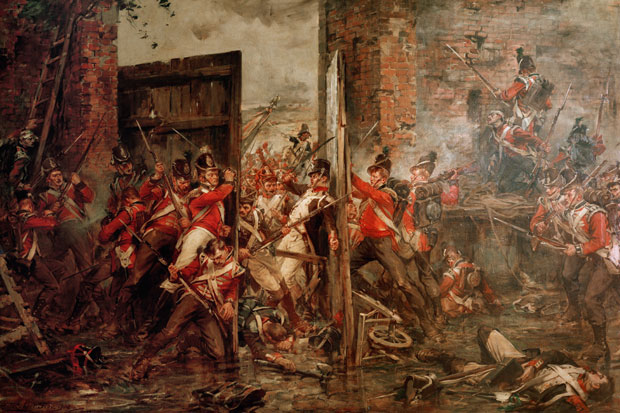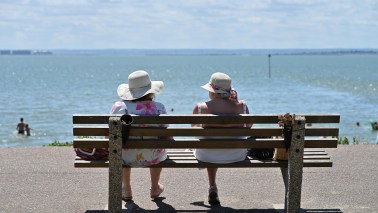The defence of Hougoumont is one of the great British feats of arms. If the farmhouse had fallen to Bonaparte’s forces during the battle of Waterloo, Napoleon’s 100 days would have become a French 100 years. But history has not been kind to Hougoumont; it fell into disuse as a farm at the end of the last century and has become increasingly dilapidated. Now, however, Hougoumont has an unlikely champion: the Chancellor of the Exchequer.
George Osborne first visited the site two years ago and was shocked by what he found. Souvenir hunters were simply removing bricks from the building. Osborne is a bit of a battlefield buff — he tries to visit a US Civil War site every time he goes to Washington for an International Monetary Fund meeting. He felt that something should be done, and started by looking to private philanthropy, writing to various companies urging them to donate to the restoration project.
But when Osborne heard that the crucifix had recently been stolen from the chapel in which the besieged soldiers had prayed, he decided that the rescue effort needed to be stepped up. The result: a government commitment to have the farmhouse restored in time for Waterloo’s bicentenary in June 2015.
At the site itself a different, less cynical, more passionate side to the Chancellor emerges. He seems thrilled when describing how the British fought back to shut the gates after the French had breached the farmhouse walls. He clambers around the site, trying to see the view that the guards defending the farmhouse had.
In this 24-hour media environment, front rank politicians need the ability to switch off. Osborne has clearly learnt that skill — during the afternoon, he produces histelephone only to photograph the battlefield and memorials. But when the conversation turns to politics and the economy, he has a settled analysis. He knows what he wants to do next.
Osborne does not need to be told what follows hubris, and is determined to avoid any premature triumphalism. He insists that there is still much hard pounding ahead and repeats the mantra that ‘a Chancellor is only as good as his last set of economic numbers’ at every opportunity in our conversation. He also points out that the Ukraine crisis, which is strikingly prominent in his thoughts, could hit European growth and possibly even prompt another flare-up of the Eurozone crisis. But he is confident enough about the near-term prospects of the UK economy to have started thinking about the longer-term challenges facing it.

Somewhat surprisingly, Osborne is keen to talk about problems that remain with the British economy. He is the first to say that this country needs to make and export more. He also feels that the financial crisis rather hid the challenge of British competitiveness in this global century. He’s clear that a re-elected Tory government would move quickly to reform welfare and education further. He is also keeping a watching brief on corporation tax, determined to maintain the UK’s advantage on this over other major economies.
The economy (or to use the campaign argot, the ‘long-term economic plan’) will be central to the Tory message in 2015. Politically, Osborne seems unbothered by Ed Miliband’s opening up of ‘clear red water’ between the parties. He is adamant that even in this post-crash world, elections are won by holding the centre, winning the economic argument and having the better leader. But when I ask him about Miliband’s agenda, he gives a reminder that the general election will provide a stark choice. The Chancellor takes it as a given that the British economy needs low taxes to attract inward investment. He seems genuinely baffled as to why Miliband would want to increase business taxes, with the message that this sends out.
If the Tories do win the next election, their second term will be dominated by Cameron’s commitment to renegotiate the terms of Britain’s EU membership. Osborne is confident a deal can be done. The Eurozone crisis has led him to spend a considerable amount of time in Brussels and he thinks he know how Britain can obtain the reforms it wants.
He argues that the northern Europeans, led by the Germans, want Britain in as a liberal and free market influence. Added to this, the eastern European and the Baltic states would, especially in this era of Russian revanchism, be loath to lose hawkish Britain, with our willingness to invest in and deploy the military. More broadly, Osborne believes that the other member states would not want to let Britain go, knowing the awful message that this would send out to the world about the European Union.
The recent economic upturn has transformed Osborne’s political standing. It has also guaranteed the Tories a decent chance in next year’s election. But when it comes to the prospect of a second-term Tory government securing a satisfactory EU deal for Britain, Wellington’s verdict on Waterloo seems apt: it will be ‘the nearest run thing you ever saw in your life’.







Comments